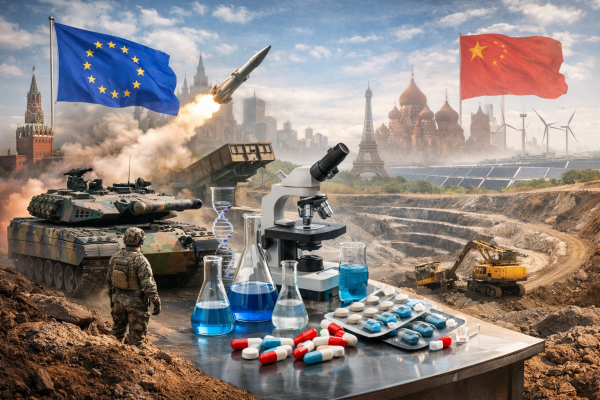April 4th, 2025 | 07:10 CEST
Bayer's cancer drugs, Defence Therapeutics' cancer vaccine, Novo Nordisk's fat burner – Back on the road to success through specialization
The new trade tariffs threaten to destabilize the global supply chains of the pharmaceutical industry, increase the prices of generic drugs, and slow innovation cycles. The only winners in this environment will be those who focus on unique innovations to ensure resilience and growth. Bayer is trying to make itself fit for the future with an efficiency program, new pharmaceutical products, and digital agriculture platforms. Defence Therapeutics excels with precision-medicine cancer vaccines based on patented technology, opening up new markets. Novo Nordisk, in turn, is shaping a multibillion-dollar market with GLP-1 therapies for obesity and diabetes based on closed production cycles. These three approaches show how specialization and adaptability open new paths in turbulent times.
time to read: 4 minutes
|
Author:
Armin Schulz
ISIN:
BAYER AG NA O.N. | DE000BAY0017 , DEFENCE THERAPEUTICS INC | CA24463V1013 , NOVO NORDISK A/S | DK0062498333
Table of contents:

"[...] Defence will continue to develop its Antibody Drug Conjugates "ADC" and its radiopharmaceuticals programs, which are currently two of the hottest products in demand in the pharma industries where significant consolidations and take-overs occurred. [...]" Sébastien Plouffe, CEO, Founder and Director, Defence Therapeutics Inc.
Author
Armin Schulz
Born in Mönchengladbach, he studied business administration in the Netherlands. In the course of his studies he came into contact with the stock exchange for the first time. He has more than 25 years of experience in stock market business.
Tag cloud
Shares cloud
Bayer – On the road to recovery
Bayer posted mixed results in fiscal 2024. Revenue fell by 2.2 % to EUR 46.6 billion but increased by 0.7% when adjusted for currency effects. EBIT before special items fell by 28%, while free cash flow rose to EUR 3.1 billion. Since the beginning of the year, the share price has risen by around 32%, significantly outperforming the DAX. Nevertheless, the long-term record remains sobering. For a decade, the Company has regularly disappointed investors. CEO Bill Anderson sees 2025 as a pivotal year for the turnaround, but the forecasts remain vague. A revenue increase of up to 1% or a decrease of 3% is possible.
The pharmaceutical division showed slight progress with 0.3% sales growth, driven by Nubeqa with a plus of 75% and Kerendia with 71%. However, patent expiries for blockbusters such as Xarelto, down 15%, and Eylea, which will expire in 2025/26, are a burden. The agriculture division, which accounts for almost 50% of sales, shrank by 4.3% – herbicides and seeds suffered from price pressure. Consumer Health posted a currency-adjusted increase of 1.9%, driven by dermatology and digestive products. Overall, the dependence on a few products and the lack of diversification remain a structural risk.
Bayer is focusing on debt reduction and was able to lower its liabilities to EUR 32.6 billion. It also wants to settle the lawsuits and score with pipeline innovations such as the cancer candidate BAY 3713372. The price-earnings ratio and a price-to-book ratio of 0.7 indicate an extreme undervaluation – but at the same time also reflect existential risks. The latest US damages award of USD 2.1 billion underscores the ongoing legal uncertainty. For investors willing to take risks, the share could be a worthwhile investment if the turnaround is successful. The stock is currently trading at EUR 21.73.
Defence Therapeutics - Precision in drug development
Defence Therapeutics, a Canadian biotech company, develops radiopharmaceuticals, antibody-drug conjugates (ADCs), and immuno-oncology vaccines using its proprietary drug platform. At the center of this technology is the Accum® technology, which efficiently releases active ingredients into cells, enhancing drug efficacy by up to 10 times while simultaneously reducing side effects.. Preclinical studies show impressive results. In mice with T-cell lymphomas, 100% survival was achieved. With the approved first-in-class therapy AccuTOX®, currently in trials for aggressive cancers, and applications ranging from ADCs to mRNA vaccines, the Company is positioning itself as a versatile technology leader.
In April, Dr. Elias Theodorou, a molecular biologist with more than 25 years of experience in cancer research and gene transfer, joined the management team as COO. The co-founder of Protos Biologics brings expertise in the development of innovative DNA delivery systems and proven leadership experience in US biotech start-ups. CEO Sébastien Plouffe sees him as the ideal catalyst to accelerate the ongoing development programs around the Accum® platform and to push US partnerships. The compensation includes 350,000 stock options exercisable at CAD 1.07.
At the end of January, Defence Therapeutics completed the second tranche of a private placement and secured approximately CAD 3.9 million, which is to be invested primarily in preclinical and clinical programs. The Company is pursuing a two-pronged strategy. On the one hand, it licenses the Accum® technology to pharmaceutical companies and, in parallel, develops its own therapies, such as AccuTOX®. The latter has already received approval from the FDA and Canadian health authorities to start a Phase 1 clinical trial. Success in expanding into the US market would be a milestone in establishing the technology as an industry standard and attracting takeover interest. Since the beginning of the year, the share price has risen by over 170% at its peak and has been consolidating since then. The stock is currently trading at CAD 1.07.
Novo Nordisk – In free fall
Novo Nordisk, once Europe's largest listed company, has lost more than half of its market capitalization since June 2024. Among the main causes is the general economic uncertainty, exacerbated by potential tariff burdens in the US. In addition, the efficacy of the drug CagriSema, which is under development, fell short of the initially hoped-for 25% weight loss, fueling skepticism among investors. Furthermore, the Company is coming under increasing pressure despite established products such as Ozempic and Wegovy, especially in comparison to its competitor Eli Lilly. Its predominantly European production also raises risks of tariff costs and margin pressure.
Recently, several announcements have cast a more positive light on the Company. Novo Nordisk is strengthening its presence in the US through the multi-billion dollar acquisition of Catalent to expand production capacity for its GLP-1 medications. In addition, the US Food and Drug Administration (FDA) accepted the Company's application to expand the approval of the oral diabetes drug Rybelsus. This could have a significant impact as the current SOUL and STRIDE studies show that both Rybelsus and Ozempic have the potential to reduce cardiovascular risks.
Thanks to its market leadership in GLP-1 products, Novo Nordisk continues to see stable growth prospects, particularly in the areas of obesity and diabetes. The latest valuation is at an attractive level. The net debt/EBITDA ratio remains below 1, and the Company has a credit rating of AA- from rating agency S&P Global Ratings. In addition, further pipeline successes suggest long-term demand will increase. Investments in US production facilities underpin the strategy of avoiding tariffs and securing global supply chains. In addition, the portfolio for rare diseases, including haemophilia, offers further diversification. Currently, a share costs DKK 465.30.
The new trade tariffs threaten global pharmaceutical supply chains, but specialization offers solutions. Bayer is bracing itself for weaker growth with an efficiency program and digital agriculture, but remains dependent on restructuring successes. Defence Therapeutics is revolutionizing cancer therapy with its patented Accum®-targeting technology, which has shown convincing results in preclinical studies and is now ready to enter the clinical Phase 1 with AccuTOX®. Novo Nordisk fights growing margin pressure with US production expansion and GLP-1 innovations despite its stock decline. In addition, Rybelsus and Ozempic could tap into the cardiovascular market. Three strategies, one pattern: Unique technologies and agile adaptation secure competitive advantages in uncertain times.
Conflict of interest
Pursuant to §85 of the German Securities Trading Act (WpHG), we point out that Apaton Finance GmbH as well as partners, authors or employees of Apaton Finance GmbH (hereinafter referred to as "Relevant Persons") may hold shares or other financial instruments of the aforementioned companies in the future or may bet on rising or falling prices and thus a conflict of interest may arise in the future. The Relevant Persons reserve the right to buy or sell shares or other financial instruments of the Company at any time (hereinafter each a "Transaction"). Transactions may, under certain circumstances, influence the respective price of the shares or other financial instruments of the Company.
In addition, Apaton Finance GmbH is active in the context of the preparation and publication of the reporting in paid contractual relationships.
For this reason, there is a concrete conflict of interest.
The above information on existing conflicts of interest applies to all types and forms of publication used by Apaton Finance GmbH for publications on companies.
Risk notice
Apaton Finance GmbH offers editors, agencies and companies the opportunity to publish commentaries, interviews, summaries, news and the like on news.financial. These contents are exclusively for the information of the readers and do not represent any call to action or recommendations, neither explicitly nor implicitly they are to be understood as an assurance of possible price developments. The contents do not replace individual expert investment advice and do not constitute an offer to sell the discussed share(s) or other financial instruments, nor an invitation to buy or sell such.
The content is expressly not a financial analysis, but a journalistic or advertising text. Readers or users who make investment decisions or carry out transactions on the basis of the information provided here do so entirely at their own risk. No contractual relationship is established between Apaton Finance GmbH and its readers or the users of its offers, as our information only refers to the company and not to the investment decision of the reader or user.
The acquisition of financial instruments involves high risks, which can lead to the total loss of the invested capital. The information published by Apaton Finance GmbH and its authors is based on careful research. Nevertheless, no liability is assumed for financial losses or a content-related guarantee for the topicality, correctness, appropriateness and completeness of the content provided here. Please also note our Terms of use.




